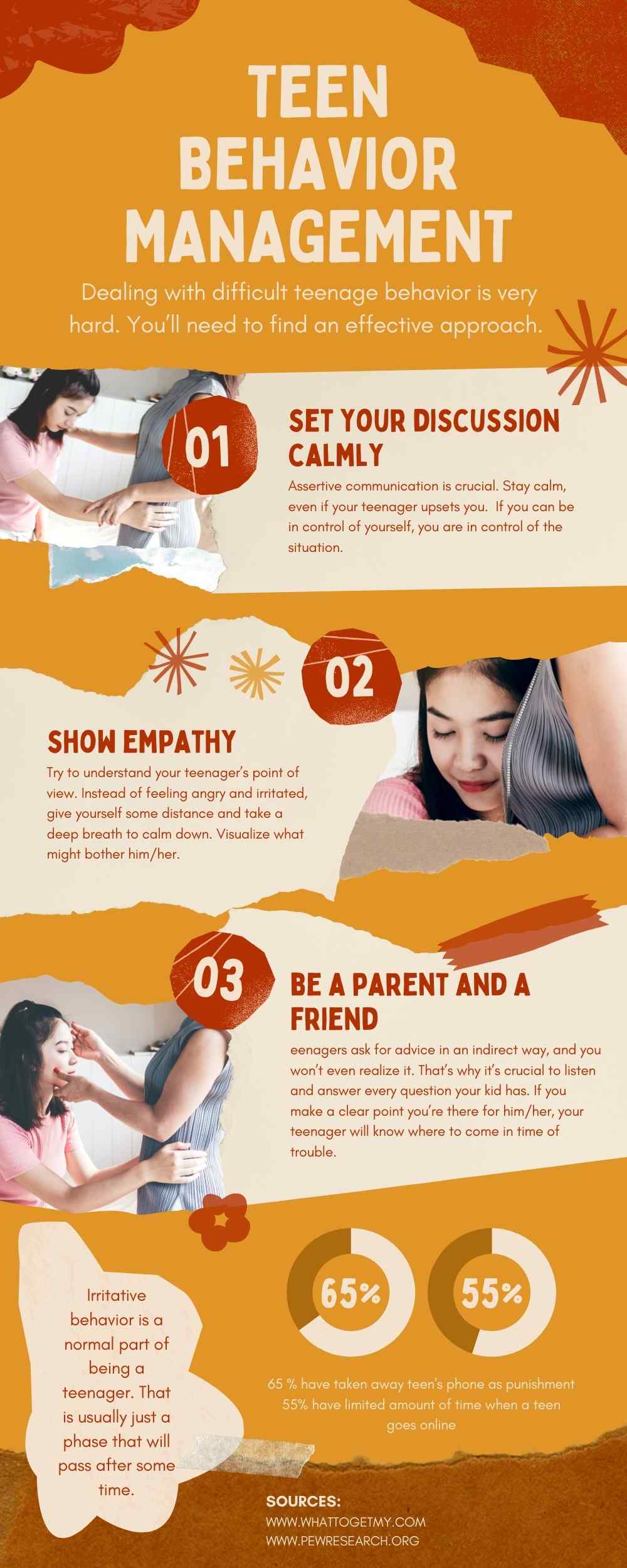Teenage Behavior Management Strategies
WhatToGetMy Instructional Article
It’s kind of funny: we’ve all been teenagers at one point in our lives, yet now we don’t understand them. Like most parents, you’re probably having trouble with your moody adolescent and you’re looking for teenage behavior management strategies. He/she spends hours hiding in the room and refuses to be a part of the family, so you don’t know what to do. Calm down; he/she is just trying to deal with all the stress and emotions which follow transition into adulthood. Your role is to help and support your child, guide him/her through life and set on the right track.
As children learn new things about life during their teen years, parents have to adapt. Think about these key points which will be discussed in the article below.
- Disrespectful behavior is a normal part of being a teenager. That is usually just a phase that will pass after some time.
- The best way to handle difficult behavior is positive communication and clear boundaries.
- Learn to distinguish between “normal” and “deviant” teenage behavior. You’ll need to know the signs of a teenager who’s in trouble, so you can get your kid professional help if he/she needs to.
- Discipline is not the same thing as punishment. Actually, you should avoid punishments and arguments altogether and opt for a calmer approach.
Teenagers: what are they like?
Teenage years are the most difficult ones. We’ve all been in a place where nobody understands our struggle to succeed in life. You felt lonely, worried and confused. That’s how teenagers feel every day. Although they act like they know everything and feel invincible, they’re usually insecure because they lack experience. We know that sounds contradictory, but that is one characteristic of teenagers – they do contradictory things. One day they will spend time with friends and family and the other they will lock themselves up in a room and refuse to do anything. They just hate everyone, they’ll say!
A teenager’s brain is actively developing, which means the part of the brain used to manage emotions, make decisions, and control inhibitions is still forming and restructuring. Therefore, until the brain reaches full maturity, your kid will make rash decisions, experience anxiety, rebel against authority, etc. These biological differences don’t excuse teens, nor they absolve them from responsibilities, but they can help you understand why they are behaving in a certain way.
If your kid is always moody and difficult, don’t worry. That’s just normal teenage behavior. However, you should start to worry if your teenager engages in self-destructive activities. For example, it’s normal that a curious teenager might try alcohol. You shouldn’t panic and overreact. If you realize he/she is drinking every day, that’s a reason for concern. Understanding teenage behavior means you’ll easily differentiate normal form deviant teenage behavior.
Negative or difficult teenage behavior is very normal. Most of it comes from peer pressure, as you might have guessed. Although teenagers strive for individuality, they crave for peer acceptance, so they might do something they wouldn’t usually. Drinking and smoking, for example, are activities you usually engage in groups. That’s why it’s important to get to know your teenager’s friends. Invite them to your home and see what are they like, what’s their area of interests and similar things, but don’t push it too much. You don’t want to be “annoying”. As you see, in dealing with teenagers it’s important to learn to balance. There will be times when your teenager pushes you to the limit and you’d want to argue with him/her. That’s why you need to calm down and don’t succumb to provocations. We’ll talk more about all of this later.
While some teenage traits are universal, don’t think they’re all alike. They are individuals with unique personalities and you should try to respect that. Your kid is learning to become his/her own person and it won’t help if you compare him/her with others.
Managing teenage behavior is hard if you don’t know how teenagers think and act. We tried to explain that all teenagers are different and they might do contradictory things. You’ll need to figure out your child’s character, so you can properly react to his/her behavior. Maybe you can start with learning about teenage interests and hobbies and see how your kid spends his/her free time.
Behavior management strategies

Source Link: https://whattogetmy.com/teenage-behavior-management-strategies/
As figured, dealing with difficult teenage behavior is very hard. You’ll need to find an effective approach. We have recommendations for you that we’ve divided into three groups. We’ll discuss how to approach communication with teens, what relationship with them should you nurture, and how can you discipline them.
Communication
1# Stop, take a deep breath and continue the discussion calmly.
When dealing with typical teenage behavior and attitudes, assertive communication is crucial. Stay calm, even if your teenager upsets you. Of course, every teenager has a “bad attitude” when you bring up the discussion. Your kid will do everything in his/her power to “push your buttons” and make you snap at them, so he/she would have an excuse to fight. Don’t let him/her get away with that. If you can be in control of yourself, you are in control of the situation. When you are discussing something with your kid, try to talk less and listen more. Don’t nag or tell your kid what he/she should feel. Just try to listen.
2# Use humor to cool off from the conflict situation
Laughter can break teenager’s shields. It can lighten the ton and take the heat of the conflict situation. After everything is back on the right track, you can get a new perspective on the cause of the problem, so you’d have a better chance of solving it. Of course, we don’t mean mocking your kid with sarcastic remarks. Teenagers are not stupid, they can tell apart sarcasm from light-hearted humor. So, don’t say something like “there he/she goes again”.
3# Show empathy and don’t over-react
In mild situations (and you get to decide what’s mild), try to understand your teenager’s point of view. Instead of feeling angry and irritated, give yourself some distance and take a deep breath to calm down. Visualize what might bother him/her. For example, try to finish the sentence “it must not be easy…”
My kid is so confrontational. It must not be easy to crave independence while living with parents.
My daughter seems so unmotivated. It must not be easy for her to deal with her school assignments, especially if she’s falling behind already.
You get the point. Think about past conflicts you’ve had with your teen and try to create one example sentence for that situation. It’ll surely help you empathize with your kid, so you can work on resolving the conflicts. This only applies to mild conflict situations. Don’t reflect on trivial things when advising what to do. That would just be interpreted, by your teen, as picky and annoying. In difficult situations, when your teenager is breaking things in the house and being violent, you’ll definitely need a different approach. That is not normal teenage behavior, and you should seek professional help.
Relationship
1# Be a role model
You can’t preach about moral values if your lifestyle ignores them, right? Teach by example! When you’re with your child, speak and act the way you want him/her to be. If you are fighting with your parents, for example, he/she will see that’s an acceptable behavior. Or you’re going around the house swearing when something upsets you, and then ask your kid not to swear. It doesn’t work that way. You’ll need to set clear goals and boundaries and follow them yourself!
2# Be a parent and a friend
We know that you’re not your kid’s buddy. However, that doesn’t mean you can’t be there for him as an honest friend. Teenagers ask for advice in an indirect way, and you won’t even realize it. That’s why it’s crucial to listen and answer every question your kid has. If you make a clear point you’re there for him/her, your teenager will know where to come in time of trouble. He/she won’t explicitly say what’s wrong though, so you need to make sure there’s nothing stressing him/her out. Of course, you shouldn’t be pushy when your kid wants to spend some time alone. Otherwise, try to spend some quality time together, go out for pizza, watch a movie together, “hang out” with your teen. Establishing a strong and trustful relationship is hard work and you’d better start as soon as possible.
3# Get to know your child’s friends
And no, we don’t mean interrogate them. Chat with them a little while you offer snacks for the movie and leave them alone to watch it. Another good idea is to let your kid throw a teenage house party. That way you can supervise and check out his/her friend circle. Plan the party together and of course, avoid alcohol. You can throw a teenage party without alcohol and still be a “cool parent”, if that’s what worries you. You’ll have some interaction with the group and still give your kid much-needed space. In most cases, you only need a few interactions with your kid’s friends and you can see through if they are “up to something”. Keep things low-key, chat about interests, hobbies, families and don’t ever embarrass your teen. He/she will not forgive you that, even if it was “an accident”, so be careful what you’re going to say.
Discipline
1# Set clear boundaries
You might ask yourself how to deal with teenage bad behavior and the answer is through discipline. For teenagers, discipline is all about setting limits. You can set boundaries or “family rules” together, so the kid feels his opinion matters and that he/she can contribute. Still, the boundaries must be clearly stated. The consequences for breaking rules must also be covered. The word “rule” might have a negative connotation for your kid, so you can use the word “boundaries”. It’s a more broad word and implies your child has more freedom.
For example, if you give your kid curfew rule “Be home by 10 pm”, he/she is more likely to break it. However, if you set a boundary, and say something like “You can come anytime you’d like, as long as it’s by 10 pm”, he/she has an illusion of choice about what time he/she can home. It doesn’t put out ”I’m in charge of your life” vibe. You’re not losing anything this way because your deadline stays the same, but your kid is more likely to abide by the set curfew.
Most teenagers will probably challenge boundaries to test the extent of your power. That’s why it’s important to clearly and specifically state what you expect from your kid. Effective boundaries are the ones that are applied consistently. Regarding curfew, you can’t let your kid come late without any consequences, because he/she will think that curfew is a flexible thing. It is not flexible; it’s a clear boundary and you need to make it that way by backing up your statements with action.
2# Let them fix the problem if they can
Don’t try to fix your kid’s problem! Instead, try to encourage independence and give guidance through the solution. If your teenager is under stress or upset about something, offer him/her an option to talk to you. When your child comes to you, don’t talk. Listen. Try assertive communication and active listening, that we already mentioned. If your teen has a fixable problem, just hear him/her out and don’t tell him/her what to do. Examine options together, so he/she can decide how to proceed. If you allow your kid to “clean up his/her mess”, it’s more likely he/she will learn something from mistakes and won’t do that again.
3# Make consequences fit the deed
Use consequences as a means of action when your kid violates set boundaries. Teenagers need to know that you are serious and fair. That’s why consequences should be immediate and in accordance with the deed. You shouldn’t be so strict and ground your kid for a month if he/she was only 30 minutes late. He/she needs to get the point but you shouldn’t treat him/her like a prisoner! A fitting consequence for being late is coming home earlier next time, for example.
The most important thing is to be consistent. You can’t let them “get away” with misbehavior because they will repeat it. All teenage behavior management techniques involve giving and then taking away teenagers’ privileges. If your kid enjoys using his/her gadgets or playing basketball you should encourage him/her in having a hobby. However, if he/she doesn’t respect set boundaries you should take away those privileges. You should inform your child in advance that this is your plan, because it’s transparency is important.
Conclusion
We gave you a brief cover of teenage behavior management strategies, so you can help your teen be more productive. However, your child might not respond to any of these suggested methods of action. He/she might even change his/her attitude drastically and avoid friends, family, and daily activities. All of this is a warning sign that there’s a deeper problem. If you see changes that don’t seem healthy to you, consider seeking professional help, from school counselors to licensed therapists.
01 HOUR 14 MINUTES
ESTIMATED TIME DESIGNING AND UPLOADING THIS ARTICLE
08 HOURS 22 MINUTES
ESTIMATED TIME RESEARCHING AND WRITING THIS ARTICLE
You Might Also Like

14 Best Baking Set For Teenagers and Cooking Gifts For Teenagers
The right baking toolset will encourage and motivate a teenager’s interest in baking. Find the right baking toolset for your teenage baker in our list of Baking Set For Teenagers. You will also find cooking gifts for teenagers as well as cooking gifts for tweens

Teenage Behavior Management Strategies
Teenage Behavior Management Strategies WhatToGetMy Instructional Article It’s kind of funny: we’ve all been teenagers at one point in our lives, yet now we don’t understand them. Like most parents, you’re probably having trouble with your moody adolescent and you’re looking for teenage behavior management

Gifts for Teenage Photographers
You probably know that photography is an expensive hobby. Keep that in mind when you’re browsing gifts for teenage photographers. A young photographer can’t afford to get all the equipment at once. You should get him/her something useful that you know he/she doesn’t have. It’s

Gifts For a Teenage Autistic Boy
Buying presents for any teenager is tough! With an autism diagnosis added, you’re in a puzzle about what to do. You might want to choose useful gifts for a teenage autistic boy that will make him relax in everyday situations. Stress relief is essential when

11 Fun Places to Go for a Teenage Birthday Party
11 Fun Places to Go for a Teenage Birthday Party WhatToGetMy Instructional Article Planning teenage parties can be quite challenging because you may be out of touch with your child’s interests and hobbies Taking your child to an event for specially planned activities can be


